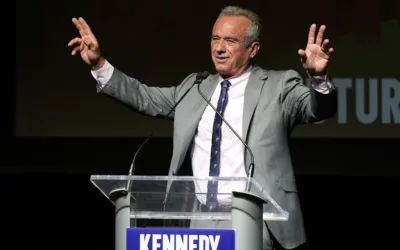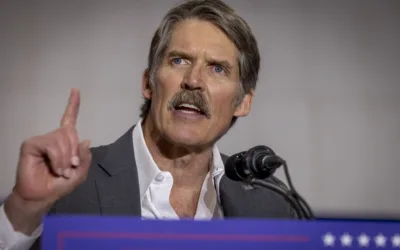
Sheila Desjarlais began a small business near Bayfield that was threatened in the early days of the pandemic. Gov. Tony Evers has allocated a significant portion of pandemic relief aid to help Wisconsin small business stay afloat during the economic downturn.
“I am as purple as you can get. I am not red. I am not blue, I could care less what party you are, your actions speak louder than words,” said Melissa Martinez, director of the Washburn Chamber of Commerce. “I think Wisconsin’s governor has done an amazing job fighting for small businesses.”
Sheila Desjarlais always wanted to open her own business.
Her ideas for what that might look like changed over the years, but she knew she wanted to work for herself. The timing, however, was never quite right. Starting a business is a risk, and between her husband’s time in dental school, establishing himself professionally, and then her giving birth to their first child, Desjarlais needed stability. So she spent 15 years working in accounting.
When the coronavirus pandemic hit in 2020, Desjarlais, a Washburn resident, was working as an office manager for a small family business in nearby Bayfield. As the virus spread across the country, she quit her job to care for her second child, who was only a few months old at the time. That’s when she started thinking again about launching her own business.
“Starting a business in the middle of a global pandemic is not really a super good idea, but in some ways, the timing was great,” Desjarlais said. “I wasn’t working, the baby was really little, my first daughter was older—she was four and she didn’t need as much care.”
Desjarlais took the plunge. She started slowly, launching Kiddwink Kids out of her own home, designing sensory kits—themed kits that include a sensory element, such as Play-doh, slime or kinetic sand, and other toys to combine with that sensory element—for children to play with.
“I was just going to make these kits and I was going to sell them at festivals and I was going to sell them online and that was going to be it for a little bit,” she said. “But I entered a business competition for the area here for Chequamegon Bay and the winner gets $5,000.”
Desjarlais won. That money was helpful, but what really allowed her to take Kiddiwink to the next level was the Wisconsin Tomorrow Main Street Bounceback program, which offered $10,000 to local entrepreneurs who opened a new, brick-and-mortar location or expanded operations in a vacant commercial space.
Desjarlais was one of more than 4,200 Wisconsin small businesses to receive funding from the program. That money—which came courtesy of President Joe Biden’s American Rescue Plan—was a huge boost for Kiddiwink Kids.
Desjarlais signed a lease for a storefront in Washburn’s main drag. The money allowed her the financial flexibility and freedom to turn Kiddiwink into a full-blown children’s boutique filled with sensory kits, hands-on activities, and handmade toys—without worrying about how she was going to scrape by for the first year.
“I wouldn’t have been able to rent and fill that space had I not received it,” Desjarlais said. “It allowed me to put money into building out the space, putting shelves in and making it like a super fun, creative space.”
Desjarlais opened her store last October and was open on a part-time basis until this month, when she expanded her hours to six days a week. She’s hired two teens and a recent high school graduate to work during the summer and hopes the store will help introduce young people to business.
“Having that money was a game changer,” she said. Desjarlais’ story is just one example of how recent federal and state pandemic relief funding has helped support small businesses, which are critical to ensuring local communities like Washburn thrive.
A ‘Sleeping Beauty’ Experiences a Small Business Revival
As the director of the Washburn Chamber of Commerce, Melissa Martinez has had a front-row seat to the city’s revitalization over the past few years.
“Washburn has been kind of a sleeping beauty for many years. A lot of these towns were dependent on different trades—coal, wood, lumber, things like that,” she said. “Dupont was really big in Washburn, that’s what built Washburn, so once that manufacturing kind of disappeared, the town kind of fell asleep over the years.”
Since October 2019, the tiny community of fewer than 2,000 people has seen 17 new businesses, including Kiddiwink Kids, open physical locations with the help of the Wisconsin Tomorrow Main Street Bounceback program.
The community also received roughly $70,000 in pandemic aid for local businesses via Wisconsin’s “We’re All In” small business grants program, Martinez said, as well as another $40,000 for the Chamber of Commerce to spend on marketing and tourism efforts.
Now, the town is running out of vacant storefronts—a night-and-day shift from just three years earlier.
“Our little town of Washburn—it’s changing,” Desjarlais said. “The block that my business is on is full. Every building now has a business in it that’s either opening this summer or just opened in the last year or so.”
“We’re seeing a lot more people in town,” Martinez added. “A lot more of the community members are staying in town because they can get what they need here instead of having to go to Ashland or go to Duluth.”
The city is getting more visitors, too. Between 2017 and 2021, the Chamber has experienced a 66% increase in room tax revenue—the tax that hotels charge people when they stay, which is then split between the Chamber and the city. Most of that increase has come since the pandemic began, with a nearly 44% increase between 2020 and 2021, Martinez said.
She has no doubt that part of the reason for the economic resurgence in Washburn is the state’s grant programs.
“I think people think, ‘Oh that business is getting $10,000 and lucky them.’ But they don’t realize that that $10,000 is going towards a lot of different things,” Martinez said. “It’s going towards buying materials at the hardware store and the lumber yard—which then they can pay their employees. And when they pay their employees, those employees go to the grocery store and buy groceries, and they buy gas at the gas station, and so it doesn’t just stay with that business, it gets compounded and shared several times over.”
Martinez praised Gov. Tony Evers—a Democrat who is up for re-election this November—and the state government, which has distributed a higher percentage of coronavirus relief dollars to economic relief and development than most other states. In fact, a recent analysis found that Wisconsin ranked first in the country in terms of what percentage of federal aid was directed to businesses.
“I am as purple as you can get. I am not red. I am not blue, I could care less what party you are, your actions speak louder than words,” Martinez said. “I think Wisconsin’s governor has done an amazing job fighting for small businesses and recognizing the hard work that small businesses have been putting in in order to survive and continue to serve their community and the people that need them. I honestly don’t know of any other state that has been as generous as Wisconsin has to small businesses.”
The Evers administration has spent more than $900 million to help small businesses, delivering aid to more than 110,000 small businesses—part of the $1.4 billion in total that Wisconsin has spent on economic resilience and workforce development.
“It’s almost like version 2.0 for a lot of these communities where their main streets are coming back to life,” said Kathy Blumenfeld, secretary of Wisconsin’s Office of Administration, a government agency that helps the governor develop and implement the state budget. Businesses in all of Wisconsin’s 72 counties received grants, she added.
Because Evers took a comprehensive approach in his economic strategy—rather than one-off special projects like the failed Foxconn endeavor—success is more likely to be sustainable, said Steven Deller, a professor of agricultural and applied economics at the University of Wisconsin Madison. “It will have a longer-term impact on the well-being of the state’s economy.”
Industry-Specific Grants Help Small Businesses Across Wisconsin
The Evers administration has also focused on launching grants and assistance programs specifically targeted at farmers, the hotel and lodging industry, summer camps, live event venues, and more.
After the pandemic turned their business upside down, Harbor Shores on Lake Geneva received nearly $107,000 from various state grants—including more than $100,000 specifically allocated for the lodging industry. The hotel’s general manager Tammy Carstensen—who personally went off payroll in the early weeks of the pandemic to make sure her management team was paid—said they used the money for marketing to make up lost revenue and for masks, hand sanitizers, thermometers, and other efforts to try to protect workers and guests.
Harbor Shores also received money through the Paycheck Protection Program established through the CARES Act, which it used to rehire staffers that were temporarily laid off and cover payroll.
“I’m very grateful because we would not have survived without the federal and state help funding,” Carstensen said. “We would not have.”
Other businesses, like Camp Ojibwa in Eagle River, weren’t on the cusp of being forced to shut down, but still found state grants helpful. The camp, which has operated since 1928 as an all-boys summer camp, received $50,000 from the state in the fall of 2021 via grants aimed at summer camps.
Ross Friedman, who purchased the camp in early 2021 and now serves as its director, said the funds have been “helpful” and are being used to make improvements to the camp, such as installing a putting green.
What the Future of Wisconsin’s Economy Looks Like
The impact of these efforts to support small businesses has been noticeable. Wisconsin’s economy has rebounded well from the pandemic, sporting a record-low unemployment rate of only 2.8% and strong wage growth. The state’s strong agriculture sector—aided by financial assistance geared towards farmers—and a surprisingly strong tourism industry helped Wisconsin weather the pandemic.
While certain sectors have recovered and communities like Madison and Eau Claire have bounced back, rural pockets of the state have struggled a bit more.
“You go to rural communities, you go to smaller towns and there’s still a lot of challenges,” said Shawn Phetteplace, the Midwest Regional manager of the Main Street Alliance, a small business advocacy organization with nearly 500 members in Wisconsin.
These urban/rural economic disparities pre-dated the pandemic, of course, and were exacerbated by the Great Recession of 2008, which hammered rural regions of the state.
“A lot of rural Wisconsin kind of never fully recovered from the great recession,” Deller said.
Still, Deller is cautiously optimistic that Evers’ approach will allow for a more evenly distributed economic recovery.
Challenges aren’t only confined to rural regions, though. Everyone interviewed for this article cited the same two challenges facing small businesses as they move forward: inflation and the ongoing labor shortage.
“Inflation’s really not helping me right now—the prices of everything are going up,” Desjarlais said.
The labor shortage is a similarly tough nut to crack and has been a generational and nationwide issue—one caused by a slowdown in birth rates, low rates of in-migration into Wisconsin from other states, and America’s unfriendly immigration policy.
The lack of workers has created a bottleneck for the economy, Deller said—a problem that is unlikely to go away anytime soon.
More Help Is on the Way
While these structural issues will take time to solve, the Evers administration has continued to implement or extend programs to help small businesses weather ongoing storms.
In May, the governor announced that Wisconsin would invest an additional $25 million in American Rescue Plan funds to help small businesses through the Main Street Bounceback Grant Program.
“We’ve heard from folks from across the state about how these funds have helped them take their businesses to the next level. We’ve also seen firsthand how these investments have helped support local economies in downtowns and communities that are now filled with unique businesses that otherwise might not be there today,” Evers said in a statement last month. “I’m proud of our work making strategic investments in small businesses and I’m excited that today’s announcement means we’ll be able to continue our work supporting main streets and communities across Wisconsin.”
The new investment means another 2,500 small businesses and nonprofits across Wisconsin will each get grants of $10,000, allowing them to fill empty storefronts throughout the state, just like Desjarlais did.
Those funds won’t solve every problem facing Wisconsin entrepreneurs; launching and managing a small business is an enormous challenge. Some days, Desjarlais wonders if she made a mistake.
“It’s a big risk—not only financially, but personally you’re kind of putting yourself out there into the community. It’s kind of like an extension of you and so there’s definitely days where I’m like, ‘Oh, is this a good idea?”
But then, someone will come into the shop and remind Desjarlais why she’s doing this.
“I had a group of girls come in to do some egg painting. This was a couple of months ago and one of them finished early and so I got her some bubbles and she got to blow them in the store, and it like made her life,” Desjarlais said. “Just seeing that gives me hope. People are excited.”
“The Bounceback grant changed my life,” she continued. “It allowed me to take something that was going to just be a part-time little hobby thing into something that is truly benefiting our community and hopefully a wider area.”
Correction: The original version of this article misstated the number of Wisconsin businesses that are members of the Main Street Alliance. We regret the error.

Opinion: It’s time for Congress to fight for small businesses instead of big corporations
May is National Small Business Month. Our elected leaders need to show leadership all year long. For the past 27 years I’ve been fortunate to pursue...

Biden makes 4 million more workers eligible for overtime pay
The Biden administration announced a new rule Tuesday to expand overtime pay for around 4 million lower-paid salaried employees nationwide. The...

Opinion: Look for the helpers
In this opinion piece, Wisconsin resident Mary Vitcenda urges voters to vote in line with their values and “look for the helpers” as they cast their...

He said what? 10 things to know about RFK Jr.
The Kennedy family has long been considered “Democratic royalty.” But Robert F. Kennedy, Jr.—son of Robert F. Kennedy, who was assassinated while...




